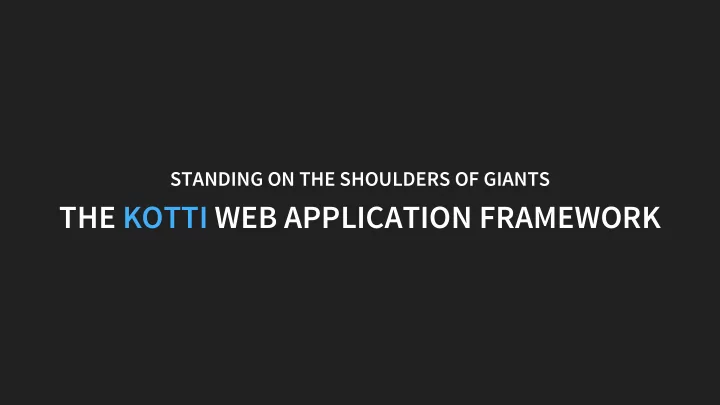

STANDING ON THE SHOULDERS OF GIANTS THE KOTTI WEB APPLICATION FRAMEWORK
ANDREAS KAISER Owner & CTO of Xo7 GmbH | Willich, Germany (next to Düsseldorf) @diskokaiser | disko | irc://irc.freenode.net/#kotti
THIS TALK Why does Kotti exist? Who are these giants? How are they utilized by Kotti? Example / Code Q&A (if we have time)
WHY? YET ANOTHER WEB FRAMEWORK?
FEATURES full featured CMS lots of add ons (varying quality) OFS (object file system) security (permissions, roles, groups) workflows
Can be a perfect choice when it fits your needs BUT does not fit all kinds of applications.
multiple competing technologies doesn't conform to "The Zen of Python" complex
FEATURES small core excellent documentation pythonic low level (micro framework) unopinionated persistence templating / forms authentication / authorization sources “framework framework”
CONCLUSION only provides stuff we need doesn't come with unneeded ballast no need to “waste time fighting the framework's decisions” perfect foundation!
MAKE SOME CHOICES! persistence traversal or URL dispatch templating & forms authentication & authorization sources
probably the most advanced ORM for Python database agnostic has many nice, useful features hybrid properties association proxies ordering list transaction integration with pyramid
THE NODE CLASS adjacency list pattern parent children single root node => node tree dictionary protocol
THE NODE CLASS DICTIONARY PROTOCOL from kotti.resources import Document from kotti.resources import get_root root = get_root() root['about'] <Document 2 at /about> root['my-document'] = Document(title='My Document', description='foo', body='<p>some HTML</p>')
THE NODE CLASS TRAVERSAL a = root['a'] = Document(title='A', description='Document A') b = root['a']['b'] = Document(title='B', description='Document B') c = root['a']['b']['c'] = Document(title='C', description='Document C') Object URL a /a b /a/b c /a/b/c
POLIMORPHIC QUERIES from kotti.resources import get_root from kotti.resources import Node root = get_root() print root.children: print(type(c)) "<class 'kotti.resources.Document'>" "<class 'kotti.resources.File'>" print Node.query.filter(Node.title == 'My Document').one() "<Document 5 at /my-document>"
JOINED TABLE INHERITANCE class hierarchy is broken up among dependent tables each class represented by its own table the respective table only includes attributes local to that class
EVENTS before_flush ObjectUpdate ObjectInsert ObjectDelete
ALEMBIC DB migrations DDL (transactional, if supported by DBMS) DML environments
has all the components for modern UIs responsive well known easy to customize
COLANDER define data schema validate & deserialize HTML forms JSON XML serialize Python structures to strings mappings lists
DEFORM render HTML forms from structures serialized by Colander outputs Bootstrap 3 forms (Deform 2)
a content workflow system states define role / permission mapping transitions define from_state to_state required permission
storing and serving files in web applications multiple backends local filesystem S3 GridFS roll your own integrates with SQLAlchemy files are handled like a plain model attribute transaction aware
WIRING IT ALL TOGETHER…
started by Daniel Nouri in 2011 BSD licensed 1.0.0 in January 2015 current version: 1.1.4 9k downloads per month still small, but active & healthy community contributions are always welcome
CODE QUALITY a.k.a. "everyone loves badges" coverage 95% build passing almost Heisenberg quality continuous integration (Python 2.6, 2.7, PostgreSQL, MySQL, SQLite) code quality A code climate 2.6 issues 5 25 39 requirements uptodate issues 5 25 39 static code analysis ( Codacy Code Climate QuantifiedCode , , ) (except 1 testing requirement)
CONFIGURATION [app:kotti] use = egg:kotti sqlalchemy.url = sqlite:///%(here)s/Kotti.db # sqlalchemy.url = postgres://user:pass@host/db kotti.configurators = kotti_tinymce.kotti_configure kotti_youraddon.kotti_configure [filter:fanstatic] use = egg:fanstatic#fanstatic [pipeline:main] pipeline = fanstatic kotti [server:main] use = egg:waitress#main host = 127.0.0.1 port = 5000
EXAMPLE OPTIONS Option Purpose kotti.available_types List of active content types kotti.configurators List of advanced functions for config kotti.root_factory Override Kotti’s default Pyramid root factory kotti.populators List of functions to fill initial database kotti.search_content Override Kotti’s default search function kotti.asset_overrides Override Kotti’s templates kotti.authn_policy_factory Component used for authentication kotti.authz_policy_factory Component used for authorization
EXAMPLE OPTIONS (CONTINUED) Option Purpose kotti.caching_policy_chooser Component for choosing the cache header policy kotti.url_normalizer Component used for url normalization kotti.max_file_size Max size for file uploads kotti.depot.*.* Configure the blob storage kotti.sanitizers Configure available sanitizers kotti.sanitize_on_write Configure sanitizers to be used on write access to resource objects
SECURITY use SQLAlchemy to… store pricipals (users & groups) in the DB attach (inheritable) ACLs to each node use Pyramid for… authentication authorization use repoze.workflow to… recompute ACLs on workflow state changes
EXAMPLE CREATING AN ADDON $ pcreate -s kotti kotti_myaddon Author name [Andreas Kaiser]: Author email [disko@binary-punks.com]: Github username [Kotti]: [… lot of output …] =============================================================================== Welcome to Kotti! Documentation: http://kotti.readthedocs.org/ Development: https://github.com/Kotti/Kotti/ Issues: https://github.com/Kotti/Kotti/issues?state=open IRC: irc://irc.freenode.net/#kotti Mailing List: https://groups.google.com/group/kotti ===============================================================================
CUSTOM CONTENT TYPE from kotti.resources import Content from sqlalchemy import * class Document(Content): id = Column(Integer(), ForeignKey('contents.id'), primary_key=True) body = Column(UnicodeText()) mime_type = Column(String(30)) type_info = Content.type_info.copy( name=u'Document', title=_(u'Document'), add_view=u'add_document', addable_to=[u'Document'])
SCHEMA DEFINITION FOR VALIDATION AND FORM CREATION import colander import deform from kotti.views.edit.content import ContentSchema class DocumentSchema(ContentSchema): body = colander.SchemaNode( colander.String(), title=_(u'Body'), widget=deform.widget.RichTextWidget(), missing=u"")
ADD / EDIT FORMS from kotti.resources import Document from kotti.views.form import AddFormView from kotti.views.form import EditFormView from pyramid.view import view_config @view_config(name=Document.type_info.add_view, permission='add', renderer='kotti:templates/edit/node.pt') class DocumentAddForm(AddFormView): schema_factory = DocumentSchema add = Document item_type = _(u"Document") @view_config(context=Document, name='edit', permission='edit', renderer='kotti:templates/edit/node.pt') class DocumentEditForm(EditFormView): schema_factory = DocumentSchema
VIEW(S) from pyramid.view import view_config @view_config(name='view', context=Document, permission='view', renderer='kotti:templates/view/document.pt') def document_view(context, request): return {} OR from pyramid.view import view_config from pyramid.view import view_defaults from kotti.views import BaseView @view_defaults(context=Document, permission='view') class DocumentViews(BaseView): @view_config(name='view', renderer='kotti:templates/view/document.pt') def view(self): return {} @view_config(name='view2', renderer='kotti:templates/view/document2.pt') def view(self): return {'answer': 42} @view_config(name='json', renderer='json') def view(self): return {'title': self.context.title, 'body': self.context.body, ...} # return self.context
TEMPLATE(S) <!DOCTYPE html> <html xmlns="http://www.w3.org/1999/xhtml" metal:use-macro="api.macro('kotti:templates/view/master.pt')"> <article metal:fill-slot="content" class="document-view content"> <h1>${context.title}</h1> <p class="lead"> ${context.description} </p> <div tal:replace="api.render_template('kotti:templates/view/tags.pt')" /> <div class="body" tal:content="structure context.body | None"> </div> </article> </html>
THE FUTURE will always stay “lean and mean in all of the right ways” Python 3 support
THANK YOU! QUESTIONS?
Recommend
More recommend